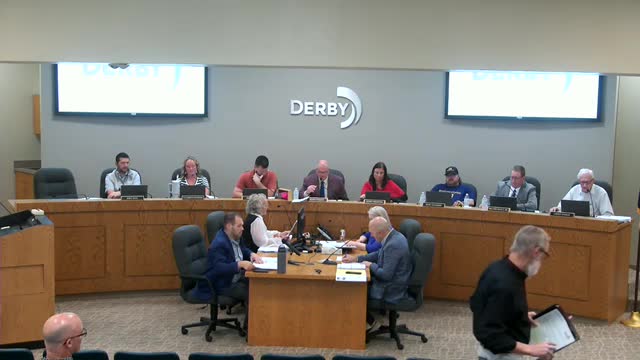Derby council approves rezoning, special use to allow new water treatment plant and wells
Get AI-powered insights, summaries, and transcripts
Subscribe
Summary
The Derby City Council unanimously approved a rezoning and a special-use permit to allow construction of a water treatment plant and two wells north of 90 Fifth Street and east of Hillside Avenue, after residents raised concerns about impacts on nearby private wells and staff described state spacing and appropriation safeguards.
The Derby City Council on Oct. 14 voted 7-0 to rezone two tracts north of 90 Fifth Street and east of Hillside Avenue from R-1 single-family to M-1 industrial and to approve a special use to allow a municipal water treatment plant and two public water wells on the property.
City Planner Scott Kanable said the project site consists of two tracts totaling about 12.8 acres, with the southern tract (roughly 10 acres) planned for a water treatment plant and a well and the northern tract (about 3 acres) planned for one well. He told the council that the city’s regulations treat water treatment plants and water wells as public utilities that require special-use approval in every zoning district, and that the M-1 district was requested because its design rules are less suburban in character and better suited to a rural utility site.
The vote followed public comment from nearby residents who said they rely on private wells and worried that new municipal pumping could lower groundwater levels. “We all rely on the same aquifer,” resident Bruce Fitzwater said during the public forum, asking the city to work with neighbors so homeowners would not be left without water.
Why it matters: The action clears a major regulatory step for the city’s plan to use its existing water rights and build local treatment capacity. The council’s approval lets the city proceed with platting and more detailed site and engineering reviews; it does not by itself authorize pumping beyond the limits set by state water appropriation processes.
Planning and safeguards: Kanable said the property is unplatted and will require final platting before the zone change takes effect; the Planning Commission had recommended approval 9-0. He told the council that any change in groundwater appropriations (the point of diversion or pumping volumes) requires submittal to and approval by the State of Kansas and that the state’s appropriation and spacing rules are designed to limit impacts on neighboring domestic wells.
City staff and engineers told the council they had sited wells with statutory spacing in mind. City staff said the local soils are sandy and the aquifer is a fast-moving system that studies show is unlikely to be significantly depressed by the proposed municipal pumping; they said regional weather and drought would be the dominant factor in local water-level changes.
Council discussion and next steps: Council Member Neal asked whether residents could obtain copies of the state appropriation studies; staff said the appropriation application and related studies are part of the state review process and that staff would work to explain the results to neighbors. Staff also said it may be technically possible in some cases to extend distribution mains to serve nearby properties but that such extensions typically carry high costs and frequently require annexation or property-owner agreements.
The council adopted the ordinances and special-use approval with a condition that the subject property be platted within one year. The approvals do not themselves change the state water right; state approval of any change in point of diversion or appropriation remains required before new pumping can occur.
Ending: City staff said they will continue to meet with nearby residents, supply information about the state appropriation process and spacing rules, and proceed with platting and site-plan review.
